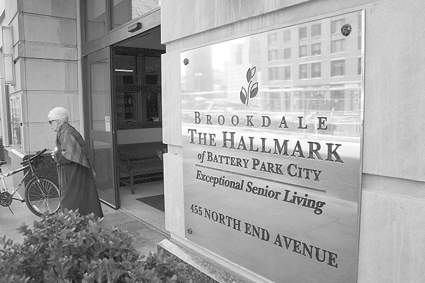By Alex Schmidt
Thirty-seven residents and staff of Battery Park City’s Hallmark home for the elderly have been stricken with a stomach virus and administrators have closed the dining hall and all other common areas.
The communal areas of The Hallmark residence community for the elderly are quiet these days. All public activities have been suspended following the gastrointestinal illness of 25 residents and 12 staff members, which began on Wednesday of last week. Four of the ill residents were hospitalized with stomach flu symptoms including vomiting and diarrhea, but as of Monday two had been released.
One resident, Ed Shineman, said that he had a bout with diarrhea around the same time that the illnesses started, but he did not know whether it was related to the virus, and he is feeling better. “I guess it’s quieter now with everything closed,” he said, adding, “they’ve been cleaning the kitchen and telling us to wash our hands.”
Residents were informed of the illness and the closure of communal spaces in a letter from The Hallmark’s executive director, Ulrich Hall, which was sent out on March 3. The letter outlines the change in meals, which are now ordered on a piece of paper and delivered directly to residents’ apartments. It also states that the Department of Health had advised the residence “of the presence of the ‘noroviral’ infection in the city, which can cause discomforts of nausea and body ache, diarrhea, vomiting and light fever. It can be contracted through ‘oral-fecal transmission’ with infected persons, touching objects in common areas and food.”
Nancy Wier, a Hallmark spokesperson, said that the closure of communal spaces is a precaution taken to reduce the chance of spreading the illness further. She said that among other measures, cleaners are disinfecting handrails and other places where people may have touched, in addition to urging residents to wash their hands frequently and refrain from touching others.
But though the ways in which a virus can spread are well understood, the initial cause of the illness is currently under investigation. Sharon Balter, a city Department of Health doctor, said through a spokesperson that in accordance with standard procedure, when a cluster of a communicable disease is reported, the agency investigates the cause of the illness. Some residents had suspected that the cause might have been food-related, but Dr. Balter said that conclusions of the investigation are still pending. Weir also added that The Hallmark did not have evidence that the illness was food-related, and speculated that if it had been, many more than 25 of the building’s 235 residents would have been infected.
The Health Dept. doctor said that gastrointestinal illnesses are common during the winter months and that while in most cases symptoms last for a couple of days, they could pose more serious problems in the elderly, such as severe dehydration. Hallmark’s Weir said that the illness is being treated similarly to the way in which a standard flu would be treated, with additional fluids and thorough checkups of individuals who had come into contact with ill residents.
Shineman said with a smile that, “I guess this is a good place.” Then pointing to his cane, he added, “It might be better if I could move around a little better.”
WWW Downtown Express
































